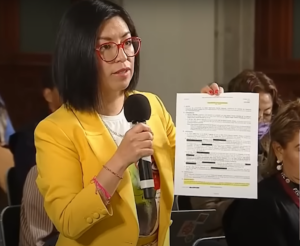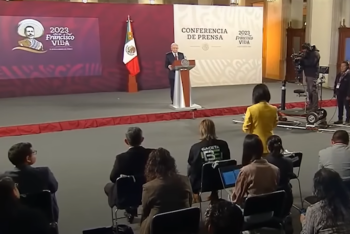Nayeli Roldán decided to become a journalist at a very young age. She always had an interest in writing and so, during childhood, she took on the practice of capturing her thoughts in diaries.
When she entered high school in her native Mexico, in a Spanish class, she was assigned to follow a newspaper for a week and find examples of journalistic genres.
Reading crónicas [literary longform journalism], feature stories and articles, at just 12 years old, she discovered this was what she wanted to do and be.
"In that high school period, I had teachers who were activists, in unions, so they always talked a lot about national politics, about class and human rights struggles, etc. So, let's say that that period was very important for me, as far as my education," Roldán told LatAm Journalism Review (LJR).
Her determination grew and, years later, Roldán enrolled to study journalism at the College of Higher Studies Aragón, a multidisciplinary academic entity of the National Autonomous University of Mexico (UNAM, for its acronym in Spanish). She fulfilled her dream, despite growing up in a context of social inequality.
"I come from a family in which I’m the only one who obtained a university degree. The poverty into which I was born could’ve condemned me to a different kind of path. But, in the end, education and my way of hanging on to what I like, to what I wanted to do in life, made part of the difference in my story being something else and not the one I was probably destined for because of my background," Roldán said.
On July 20, Columbia Journalism School in New York City announced that Roldán was one of the 2023 recipients of the Special Citation of the Maria Moors Cabot Prize, the world's oldest international journalism awards.
During the announcement, the Cabot Prize jury highlighted that Roldán has been a reference point for journalism in Mexico, a country with some of the worst figures in the world for violence against journalists. They also considered her "an example of unfailing journalism in the face of adversity."
For Roldán, these awards are a source of great pride and happiness.
"It’s an incentive, without a doubt, but I will always say that I do journalism because that’s my way of life and I can't imagine doing anything else," Roldán said. "I don't do journalism for the awards. When they come, of course they make me very happy and the ceremonies are extremely exciting. But, after receiving the prize, the next day I work just the same, I go after the story, looking for findings, interviewing and doing the work as I do every day."
Roldán thinks of herself as a rebel. In her early days as a reporter, she said a boss reproached her for investigating powerful politicians and pitching "uncomfortable" stories.

Nayeli Roldán describes herself as "rebellious, critical, utopian, reader, frank, formerly anti-Twitter and very happy." (Photo: Screenshot)
"He said I was a rebel. As soon as I heard that, I recognized his words and told him: ‘Yes, you’re right, of course I’m a rebel,’" Roldán said. "I was indeed rebelling or had lived a life of rebellion, not settling down for what I was supposed to do."
Roldán has adopted these words to the point that in her profile bio on X (formerly Twitter) she describes herself as "rebellious, critical, utopian, reader, frank, formerly anti-Twitter and very happy."
In March 2023, Roldán brought out some of these characteristics when she questioned President Andrés Manuel López Obrador (AMLO), during his morning press conference about the Mexican government's spying on journalists and human rights defenders using the Pegasus technology.
Roldán was attacked by AMLO during the conference and also suffered bullying on social media in the following days.
"What happened to me is a taste of what other journalists who ask questions that are inconvenient for the president have also suffered. It’s an uneven position. The president is up there, on a platform that has the highest reach and that is the most powerful in the country, while we are only reporters," Roldán said.
In spite of the attacks, Roldán says she feels privileged in comparison with her colleagues in other states of the country, far from the capital, who live in precarious working conditions without support or protection networks.
"The conditions in which we journalists in Mexico City do investigations are very different from what happens in the states. They are the ones who, in truth, do good journalism under constant danger, under constant siege. I will always take advantage of these forums to insist that journalists are being murdered in Mexico. From the year 2000 to 2022, 161 journalists have been murdered and, of these, 41 happened during the current government," Roldán said.
During her nearly 20 years of journalistic experience, Roldán has investigated corruption, politics, espionage, fraud, and gender violence.

Roldán questioned President Andrés Manuel López Obrador, during his morning conference about the spying by the Mexican government using Pegasus. (Photo: Screenshot)
For the past nine years, she has been a team member at Animal Político, an independent digital publication born in Mexico in 2010. She’s had the opportunity to co-author award-winning investigations such as "La Estafa Maestra," which received the 2017 National Journalism Award and the 2018 Ortega y Gasset Award.
Additionally, she said Animal Político has given her the freedom to pick her own topics and lead ambitious projects.
"I firmly believe that journalism is a way to contribute so things can improve, so our environment at some point can change for the better," Roldán said. "To the extent that people have information, know who governs us, what they do with our public resources, what are the policies for victims and what is happening at the security level, people will be able to make their own decisions...My plan for the future is to continue doing rigorous journalism, a service journalism."